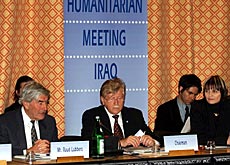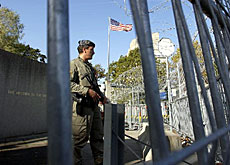ICRC calls for action to help “the missing”

With war looming against Iraq, the International Committee of the Red Cross (ICRC) is hosting a major conference in Geneva this week focusing on the issue of missing persons.
The problem is particularly acute in wartime, when casualties are often unaccounted for.
The ICRC estimates there are millions of people around the world who have disappeared as a result of war and internal strife, and whose families have no idea what happened to them.
This week’s conference marks the first time the problem has been dealt with on such a broad scale. Around 350 experts from 90 countries, including representatives from the United Nations Human Rights Commission, are taking part in the three-day talks.
Their objective is to identify and agree on ways to prevent people from disappearing and to respond to the needs of families who have lost their loved ones.
They also hope to raise awareness of the issue among government authorities, as well as the UN and non-governmental organisations.
The Swiss head of the ICRC, Jakob Kellenberger, opened the conference on Wednesday by calling for action “for the sake of the people who have faced the devastating violence of war and of those who may be threatened with it in future”.
Without a trace
Civilians represent the vast majority of “the missing”, although a large proportion is also made up of men who have been involved in combat or violence.
One of the main obstacles facing investigators and aid workers is identifying soldiers slain on remote battlefields or bodies that have been dumped in anonymous graves.
The ICRC hopes the conference will result in a set of common standards when it comes to technical and forensic procedures which are used to collect information on human remains.
“If somebody were to fall into Lake Geneva, the dead body would be fished out and it would be immediately identified,” said ICRC spokesman Florian Westphal.
“In wartime, however, the bodies are often looked at for evidence and they’re not necessarily identified… so the families never find out what happened.”
The problem was underscored at the opening of the conference by the head of Sri Lanka’s Association of Parents of Servicemen Missing in Action, Visaka Dharmadasa. An estimated 8,000 people have disappeared in Sri Lanka and Dharmadasa’s son is one of them.
“The trauma that the family has to undergo cannot be described in words,” she said. “If we can minimise the problem of unidentified bodies, there will be a huge decrease of the missing.”
Political will
Another aim of the talks is to agree on operational practices to prevent people from going missing in the first place.
“If you look at the wars of the 20th century, you won’t find a single one where there weren’t any missing persons,” Westphal told swissinfo.
“With the prospect of war against Iraq… it’s very important to take preventative measures, such as issuing ID tags to soldiers.
“It sounds straightforward but the fact is that many armies and rebel forces don’t have this kind of system and when their fighters fall and are killed, it’s often not possible to establish who they are and where they come from.”
Westphal points out that another obstacle in identifying the missing is that governments in conflict zones are often reluctant to own up to the violence that has occurred.
“Dealing with this issue means coming clean about what they’ve done and crimes their forces might have committed,” he said. “It can also mean re-opening fresh wounds in a situation where peace is still shaky and they’d rather not talk about these things.”
According to the ICRC, funding is also a problem and it hopes that industrialised nations taking part in the conference will make a financial commitment to the cause.
Humanitarian law
Ultimately, ICRC chief Jakob Kellenberger believes international humanitarian law must serve as the backbone for any legal framework that is established to deal with the problem.
“The duty to respect humanitarian law and to avoid abuses lies with all actors in situations of armed violence… and it must become the unavoidable marker for any party involved in confrontation.”
Switzerland’s ambassador to the UN, Jean-Marc Boulgaris, backed up Kellenberger’s statement by pointing out that the problem was relevant to both international humanitarian law and human rights.
“The various initiatives at the international level, be it in international humanitarian law, in human rights or even in international criminal law… demonstrate that the subject must be addressed in its entirety,” he told meeting participants.
“But even more, respect for human dignity is both the reason for all of our efforts and the basis of them,” he added, “whether it’s in exchanging information on missing persons, in exhuming and examining their remains or in contacting their families.”
swissinfo, Anna Nelson in Geneva
The ICRC estimates that millions of people have disappeared as a result of war and internal strife.
Their families often wait for years or decades to discover what happened to them.
The vast majority of “the missing” are civilians and men killed in combat situations.
The ICRC says identification and prevention would help reduce their numbers.
More than 100,000 people are listed as missing in Rwanda.
There are at least 22,000 unresolved cases in former Yugoslavia.
Over 6,000 Peruvians have also disappeared.

In compliance with the JTI standards
More: SWI swissinfo.ch certified by the Journalism Trust Initiative












You can find an overview of ongoing debates with our journalists here . Please join us!
If you want to start a conversation about a topic raised in this article or want to report factual errors, email us at english@swissinfo.ch.